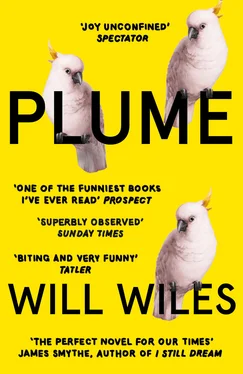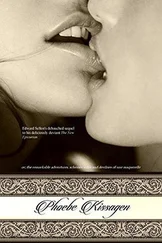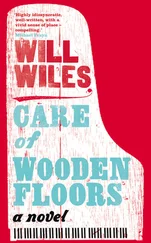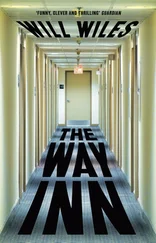The grit and stain was washed from the recesses of my mouth. Cold brilliance. Appeased for the moment, the Need receded. The choking fog around me parted and I saw the leftovers from the previous night. Grey tatters of lettuce on a sauce-smeared, greasy plate, plain newspapers balled up nearby, seven empties crowded on the little table beside the sofa – none spilled. The cushions were piled up on one side of the sofa, still indented with the impression made by my reclining form. It was dark in the living room, but it was always dark in the living room. The only natural light came through the glass roof of the kitchen extension, and that was the depleted stuff that had found its way through the winter sky and down into a canyon between the backs of Victorian terraced houses. It was further filtered by the grime that had built up on the glass roof, and the branches of the neighbours’ lime tree.
‘Good morning,’ I said to the black skeleton of the tree. It dripped filth in response.
I started to pick up empties. One turned out to be two-thirds full, and the surprise weight almost caused it to slip from my unready fingers. Another, tucked behind the lamp on the table, had about a third left in it. How long had they been there? Were they from last night, or earlier? Three days was a gamble.
The empty empties I crushed and put in the recycling; the part-empties I left by the sink. Then I sat on the sofa. The drilling had not stopped, or even subsided, but I had a little insulation in my head now, and it was at the other end of the flat. And only on the one side, for now. I felt pretty good, relatively. The meeting with Pierce was set for eleven, a civilised time, and I wasn’t expected in the office until Thursday. That was an aeon away. All that mattered was not screwing up the Pierce interview – and I was unusually well-prepared. I had actually read Pierce’s books and many of his articles; that was the reason I wanted to interview him in the first place. I just had to focus and stick to it for a couple of days, and the Polly-threat might recede, give me some time and space to get my head together, to make some changes, stabilise things.
‘Getting myself back on track, yes indeed,’ I said to the tree. ‘What do you have to say about that? Two interviews today, and they’re both going to go great.’
It had nothing to say about that.
The TV and DVD player were on standby, not completely off; they had done this themselves during the night. So discreet, so obliging. I turned the TV on and switched to the news. London Blaze , said the red caption beside the crawl.
‘… real concern isn’t the fuel but some of the additives used in some of these related processes, which we understand were on the site.’ Not a newsreader voice but the unpolished, hesitant voice of an expert, speaking over pre-dawn helicopter footage of the fire, hungry orange squirts of flame, the smoke column like a thick black neck attached to a head that was buried in the ground, swallowing, chewing, consuming. Around it, a necklace of twinkling blue lights.
‘So just how concerned should we be?’ The interviewer, a female voice, cut in. I liked this question. I wanted to precisely calibrate my concern.
‘Well, as I say,’ the interviewee, a male voice, said, ‘it’s not really a question of the fuel but the other chemicals that may have been present; now we don’t know what these were exactly, not as yet, but we understand there were substantial quantities of material on the site, and some of these can be, well, you wouldn’t want to put them on your cornflakes, ha ha, but still the question as always is one of quantifying risk.’
One of those morning interviews, then, when the interviewee’s time isn’t particularly important and there are unending minutes to fill. Slightly informative noise had to be created to cover the real interest, the pictures. Not the helicopter any more: footage from the ground, also shot before dawn, of fire crews directing inadequate-looking streams of water into a pulsing orange hell, the ground a reflecting pool in which coiled hoses wallowed.
My can was half empty already, its comforting weight gone, its top warm. I returned to the kitchen and topped it up from the one-third-full can I had found behind the lamp. Waste not, want not. The coldness and fizz of the remaining half of the fresh lager would take care of the flatness and warmth of the older stuff. But as a precaution, I poured it through a metal tea-strainer I kept beside the sink. In the past there had been instances when I had watched, horrified, as a glob of mould had slipped from a too-far-gone can into perfectly good beer. It was heartbreaking to have to pour it all down the sink. And there had been times when I had not washed it away, and they were even worse. But the strainer, found in a charity shop, had been a useful investment. This time nothing was intercepted, and the found beer frothed in a reassuring way. I had three cans in the fridge. That would probably do me for the morning.
‘Chances of a serious reaction are one in a million, one in 10 million really,’ the television voice was saying.
‘Ten million people in London,’ I said to the TV, ‘so one poor bastard …’
I tried to drink from the refilled can, but misaligned the aperture with my mouth, dribbling beer down the front of my T-shirt.
‘Shit.’
I ran the back of my wrist across my chin. The drilling, which had paused for breath, chose that moment to resume. I hated the pauses in the drilling more than anything, because they invited the thought that the noise might have stopped for good, which was seldom the case. The builders on the other side were now making their own contribution: a hammer-blow, perhaps metal against metal, which repeated eight or nine times, then stopped, then started again. Through the flat, from the direction of the street, came the throat-clearing sound of a diesel engine and a steady rattle of machinery.
I threw the tree an angry glance. It was planted in next door’s back garden, another of their multiple insults. Through the splattered glass of the kitchen ceiling, I saw a flash of white in its black limbs.
A cockatoo, sitting in the tree, looking down at me.
No, not possible.
I changed my position to get a better view through one of the cleaner patches of grimy glass. The white shape ducked from view. I stepped back. There it was again – not a cockatoo, but a white plastic bag caught in the branches.
Pacing back to the sofa, I took my laptop from my shoulder bag and switched it on. The noise was intolerable, something had to be done. What, exactly, I did not know, and as a renter my options were limited.
To: dave@davestocktonlets.co.uk
Subject: Re: Re: NOISE
Hi Dave,
I had never met Dave, my landlord, but he was pleasant enough on email, if he replied. We had corresponded about the noise before and he made sympathetic sounds and said there was little he could do. But emailing him was my only outlet. The owners of the neighbouring houses were never around, of course – even when their homes weren’t the building sites they are now, I never saw them. Even if I could reach them, why would they do anything for me, a private tenant? I was simply nothing as far as they were concerned.
The email got no further than the salutation. Through the drilling, I heard an agitated rattling of my letterbox, then a triple chime on my doorbell. That special knock, this time in the morning, meant I knew at once who it was, and I groaned. Her, one of the ones from upstairs.
I wasn’t dressed but there was little point. The lager had soaked into the T-shirt and contributed to any pre-existing odours.
When I opened the front door I tried to stay mostly behind it. The icy air made me flinch. Her breath was fogging; she was dressed in running gear, a headband holding back dark blonde hair, her top a souvenir from the London School of Economics. She had been jogging on the spot, but stopped when I appeared, and took the headphones out of her ears.
Читать дальше












